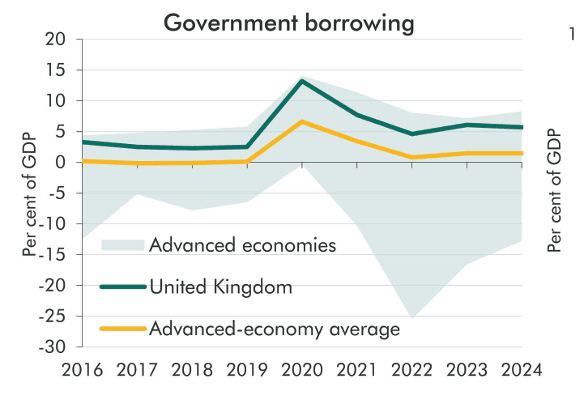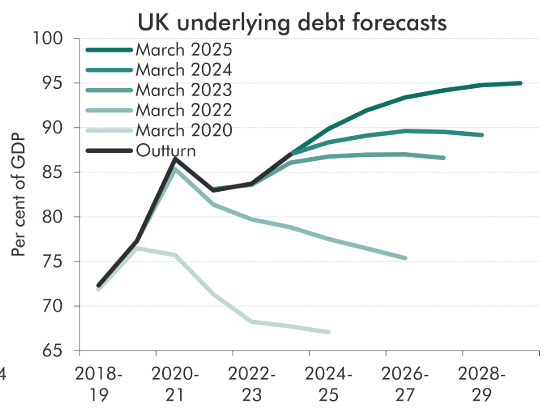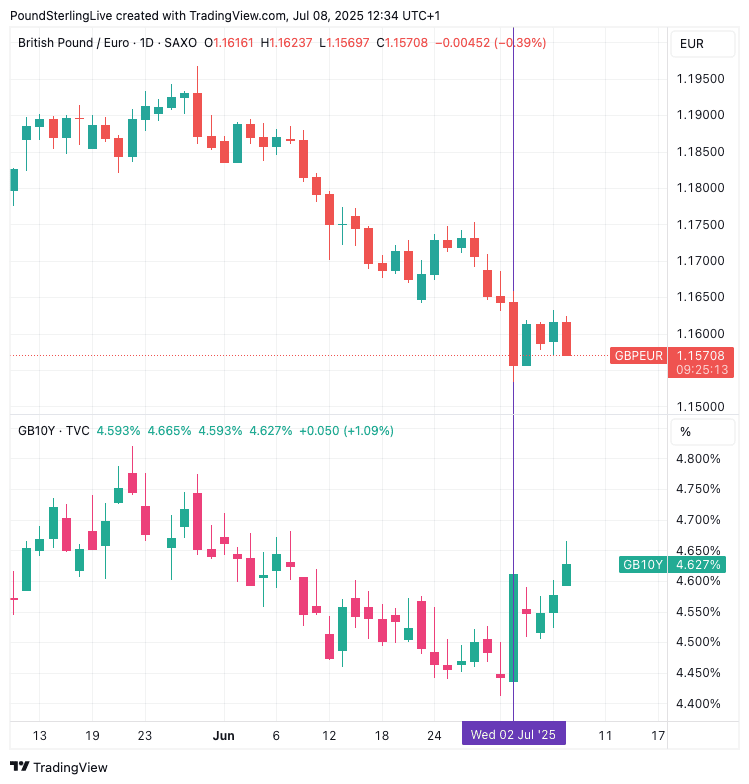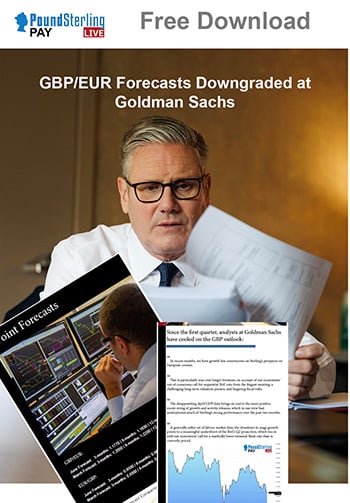
Picture by Simon Dawson / No 10 Downing Street
The British Pound is back under pressure as fears for the future of the country's finances mount again.
UK bond yields rose sharply and the Pound fell following the publication of a report warning the UK's debt growth is rapidly becoming unsustainable.
The Office for Budget Responsibility (OBR) - the government's de facto financial watchdog - warned in its latest Fiscal Risks and Sustainability report that "the risks to the fiscal outlook are mounting."
It found that "efforts to put the UK's public finances on a sustainable footing after a series of global shocks have met with only limited and temporary success in recent years, leaving the UK with the sixth-highest debt, fifth-highest deficit, and third-highest borrowing costs among 36 advanced economies."
The report is released just days after markets baulked at the government's failure to rein in welfare spending.
Last Tuesday Sir Keir Starmer abandoned efforts to reform welfare, which would have saved a miserly £5BN per annum. But the market only reacted noticeably last Wednesday, when Starmer's top finance minister, Rachel Reeves, cried in Parliament.
Markets were unhappy that Starmer failed to confirm she would be keeping her job in the wake of the climb-down on welfare reform, leading to fears she would be replaced by someone more left wing.
The Pound and UK bonds (gilts) fell, and the yield on those bonds spiked. This is a classic warning signal that the market has fears about financial stability.
Above: Pound down, yields up. The above chart shows this unsavoury development occured last Wednesday, and is occurring again today.
Markets are increasingly sensitive to the notion that the government is losing its grip on finances: the OBR's latest assessment is that without policy change, borrowing is projected to exceed 20% of GDP and debt to exceed 270% of GDP by the early 2070s.
UK bond yields have risen alongside the report's release, suggesting investors are demanding greater compensation for holding UK debt.
That yield reflects, in part, the premium investors demand against a potential default and losses to inflation.

The UK's debt dynamics are comparatively worse than elsewhere. This means the market will likely test the UK first, causing jitters in Sterling and gilts.
Typically, rising yields boost the Pound because international investors seek greater returns for their investment in the underlying bonds.
However, when rising yields stop attracting these investors, it implies the risk premium is rising to an extent that is no longer deemed acceptable.
"If rates move too high, GBP may no longer find support either. Higher market rates could be driven by increased term premium demanded by investors in response to concerns over the fiscal outlook," says David S. Adams, a strategist at Morgan Stanley.

The UK's debt burden is seemingly continually revised higher.
Starmer's welfare reforms were supposed to shave an inconsequential £5BN off the government's borrowing requirements. However, the inability to achieve this paltry saving sends a clear signal that no savings of consequence can be expected at all.
The debt train is seemingly steaming forward without a driver.
A major problem facing the government's finances is the pensions system, where current (2024-25) spending amounts to £138 billion or 5% of GDP.
It is projected (by the 2070s) to reach 7.7% of GDP. The triple lock cost, which guarantees the pension rises in real terms, was originally expected to cost £5.2bn by 2029-30. However, it is now forecast to cost £15.5bn due to earnings and inflation volatility.
"Wth the UK government’s cost of borrowing now consistently the highest in the G7, and no sign that public spending is being brought under control. Too many subjects are still taboo, such as real reform of the NHS, or unpicking the ‘triple lock’ on the state pension. Politicians must be more honest with the public about the costs and trade-offs involved - and voters need to be more willing to listen," says Julian Jessop, Economics Fellow at the Institute of Economic Affairs.
Robert Colvile, Director of the CPS think tank, called today's OBR report a "spreadsheet-filled horror story. It is the bureaucratic, non-partisan equivalent of grabbing our politicians by the lapels and screaming in their faces. It is very, very bad."
The risk for the Pound is that markets realise this too, and trade accordingly.


